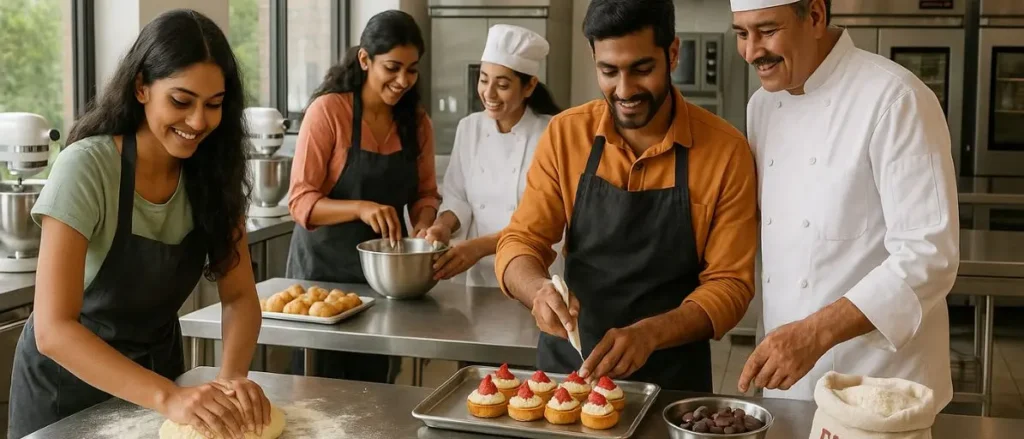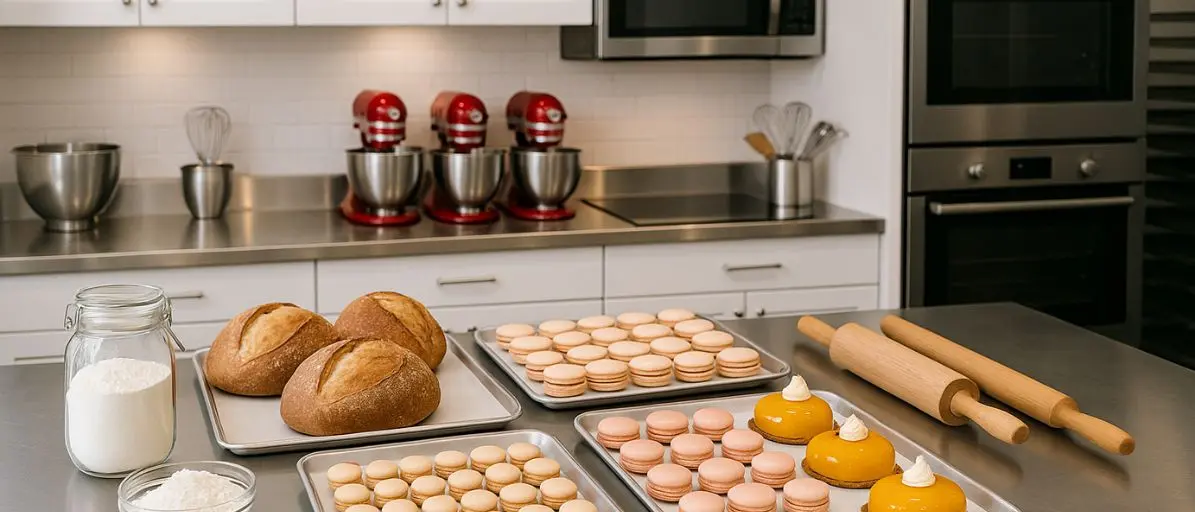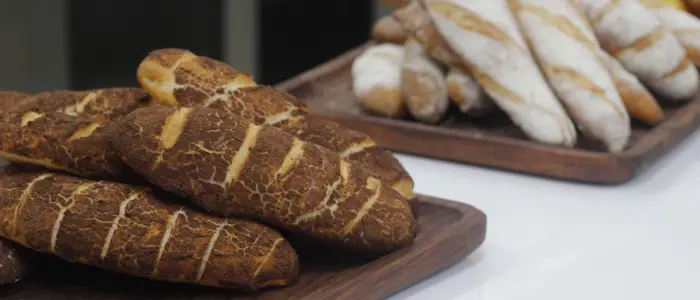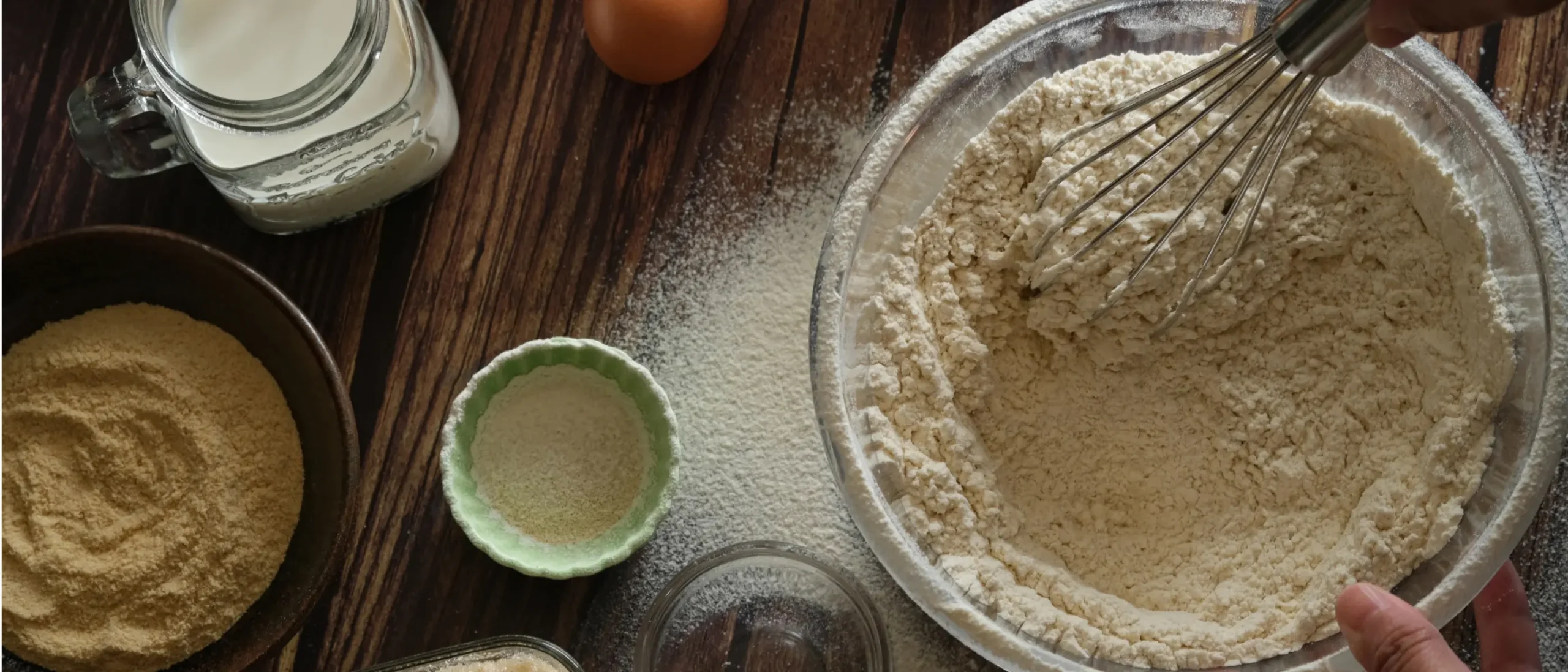If you dream of having your own patisserie or just want to make great sourdough at home, picking the right baking course really matters. Because baking offers both creative fulfilment and real job opportunities, the choices you make today may change your future for the better. We’ll help you choose a course that matches your aims, your speed, and your career hopes.
1. Define Your Baking Goals
Ask yourself some questions before you decide to enroll:
- What makes you want to take this course?
- Do you want to start from the basics if you are new to baking?
- A person who enjoys baking as a hobby but wishes to turn it into a career?
- Do you want to be a pastry chef or at a high-end restaurant?
Your baking goals will shape your choices, whether it’s the kind of class you join or the way your instructor will teach you. Whitecaps have options for everyone, from new bakers to seasoned pastry lovers, so defining your aim is very important.
2. Choose Between Online and In-Person Learning
Both modes offer unique advantages:
Online courses:
- Flexible schedules
- Learn at your own pace
- Often more affordable
In-person courses:
- Hands-on practice with immediate feedback
- Direct interaction with chefs
- Hands-on activities use specialised gear and premium ingredients.
Those who want to take baking seriously should think about programmes like the Cake Engineering course, which gives practical experience and advanced kitchen knowledge.
3. Check Instructor Credentials
Would you let someone without professional kitchen experience show you how to temper chocolate or laminate croissants?
You should choose a baking course where expert chefs, especially those with experience in places such as France or Italy, teach the lessons. At Whitecaps, Chef Arvind Prasad, an award-winning pastry professional, guides both the academic and research departments, making sure your learning benefits from his industry expertise.
Look for:
- International experience
- Awards or recognitions
- Hands-on teaching style
To make things even better, you can also gain advice from master chefs across the world.
- Peter Gyorgyicsek
- Beesham Soogrim
- Clement Nadeau
- Amaury Guichon
Because of these names, you can experience firsthand decades of international pastry making, amazing talent, and new techniques at Whitecaps.
4. Review Course Content and Curriculum
Pay no attention to fancy labels. A strong baking curriculum should mix theoretical and practical learning as you learn from beginning skills to more specialised subjects.
Things to look for:
- Sourdough, Viennoiseries, entremets, plated desserts
- Scientific baking theory
- Ingredient behaviour
- Recipe formulation and costing
Cooking is just one part of the job now. These days, being a great baker or chef isn’t just about what happens in the kitchen. That’s why our curriculum also focuses on giving you a wider, career-ready skill set.
What Else You’ll Learn:
- Food photography and styling for content creation and digital menus
- Marketing & branding to help you build your personal or business brand
- Entrepreneurship sessions to guide your journey from idea to food business
- Budgeting & costing to manage operations efficiently
- Industrial visits for real exposure to commercial kitchens and production units
- Hygiene & food safety training aligned with industry standards
To see a complete curriculum, check out our Diploma Baking Programme, which combines traditional methods with modern baking knowledge.
5. Look for Hands-on Opportunities
True lessons are learned by touching the dough.
Top-tier programmes offer:
- Individual workstations
- Students get to use up-to-date mixers and ovens from the culinary industry.
- You will learn how to work with chocolate, fondant, and sugar art.
Whitecaps equip students with:
- Advanced personal toolkits
- Industrial-grade culinary equipment
Premium ingredients for practice
The result? It’s not just about seeing baking; you actually do it. And if you’re curious about how to start a baking business in 2025, you can explore this detailed guide on how to start a baking business.
6. Consider Course Accreditation and Certification
Getting certified isn’t just a checkbox, it can open doors. A 2023 survey by Statista found that 68% of chefs said earning a certification helped them find work and gain industry respect. Enrolling in a structured training program not only sharpens your techniques but also strengthens your professional reputation in the culinary world.
According to the U.S. Bureau of Labour Statistics, employers increasingly value certified chefs, especially in competitive kitchens where standards are high. Certifications may also lead to better pay and more job opportunities.
Look for:
- Certificates recognised by City & Guilds, London
- International affiliations
- Industry tie-ups for internships
Whitecaps follows global culinary standards and offers the Level 3 Diploma, the highest certification in baking, which is recognised in India and internationally.
7. Placement Support & Internships (For Professionals)
It’s one thing to graduate from a course. It’s also different to succeed in making it your profession.
Professional baking courses should offer:
- Resume support
- Portfolio building
- Industry placements
Once you graduate, we have partners where we can place you. These partners include some of the reputed hotels like Hyatt, Atlantis Dubai, The Leela Palace, Taj Hotels and Resorts, Oberoi Hotels & Resorts, ITC Hotels, JW Marriott, Sheraton, and many more.
The Whitecaps’ France Internship Program lets students gain practical experience in European patisseries and use what they learn in class on an international stage.
8. Tools, Resources & Ingredients
Having the correct tools is essential for learning. Does the course let you use:
- Will you wear chef coats, aprons, and other proper attire?
- You will have access to essential ingredients like couverture chocolate, almond paste, or even edible gold.
- Recipe compendiums and study materials?
- A professional chef uniform set
- Premium ingredients provided in class
- Your recipe pack and extra study material are provided for free.
. Take home your creations
9. Peer and Alumni Network
A robust alumni network is a significant indicator of a course’s reputation and can play a pivotal role in your professional journey. Engaging with such networks offers numerous benefits:
Benefits include:
- Job referrals
- Mentorship
- Collaboration opportunities
Ask:
- Do they offer alumni special events?
- Are there active online groups?
- Can the institute put you in contact with alumni members?
Alumni networks can play a valuable role in your career, offering support through job leads, mentorship, and professional connections.They help maintain a lasting relationship between students and the institute, creating a strong sense of community and ongoing growth opportunities.
10. Cost vs Value
It’s important to look at the price, but the main question should be what you get out of it.
Ask yourself:
- Is taking this course just for fun, or is it a way to improve your career?
- Does this course help you get recognised outside your country?
- Are all ingredients, tools, and materials included in the training?
Whitecaps courses are built for those who want more than just a certificate – skills, exposure, and global-level training that stays with you.
11. Duration and Flexibility
The amount of time you must dedicate can change a lot depending on the baking course you pick. You should select a program that works with your own schedule and learning speed.
Ask yourself:
- Will you be able to attend classes every day, or do you need night or weekend options?
- Do you like the idea of a compact 12-week boot camp, or do you need a longer, 1-year option?
Whitecaps has modular programs that make it possible to handle a busy schedule and still get quality instruction.
12. Placement and Industry Exposure
Outstanding baking institutions teach you and also find you jobs.
The American Culinary Federation found that 81% of recent graduates said getting real-world experience during their course was important in finding their first role.
Look for institutes that offer:
- Arrangements with well-known hotels and bakeries
- Opportunities for paid internships
- Exposure to campus job fairs and on-site demos for industries
With relationships in India and Europe, Whitecaps creates a smooth path from school to jobs for students. Whitecaps’ partnerships with top global brands and hotels help with job placements and guarantee students have the skills needed for their first day.
13. Learning Environment and Culture
A good learning atmosphere can increase your chances of achieving your goals. Being in a positive and encouraging environment helps students become creative, successful collaborators, and confident thinkers.
Things to consider:
- Student-to-chef ratio
- Being able to count on support staff and mentors.
- Class diversity and team projects
Taking a tour or talking to people who have graduated can help you see what the school’s environment is like. Whitecaps, for example, encourages a teamwork-based and creative approach to education, making sure each student feels respected as a future expert.
Final Thoughts
Baking isn’t only about recipes; it’s about going on a journey. If you hope to learn macarons or start a dessert bar, the right course will motivate your creativity and lift your confidence. Learning at places such as Whitecaps International School of Pastry means you’re not just memorising recipes, you’re being taught to bake with expertise.
Before you commit to a course, take a moment to explore how baking and pastry differ, each comes with its own creative journey.
Frequently Asked Questions (FAQs)
Q1: How should I go about choosing a baking class if I am someone with little experience?
Hands-on activities, great guidance from staff, and mastering the basics should be included.
Q2: Does getting certified help in a baking career?
Yes, having a certificate that employers worldwide recognise helps you stand out and get better opportunities in hospitality or as an entrepreneur.
Q3: Is it worth doing a baking course online?
These courses let you learn at your own pace and focus on your hobby, although you can’t get real-time help or do practical work.
Q4: How is Whitecaps Baking Institute different from the others?
Whitecaps offers training from experts across the world, access to excellent equipment, live chef lectures, and career help.
Q5: How long does it take to complete a professional baking course?
The duration varies from as short as 5 weeks to 6 months, depending on what course you choose and specialise in.





